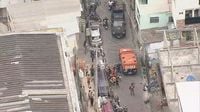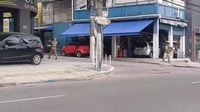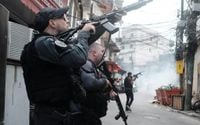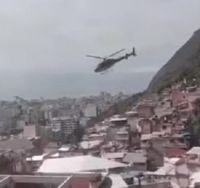On Tuesday, April 15, 2025, the Civil Police of Rio de Janeiro launched an operation in the Ladeira dos Tabajaras, a community located between the neighborhoods of Copacabana and Botafogo, targeting the murderers of civil police officer João Pedro Marquini, 38 years old, who was killed during an attempted robbery on March 30, 2025. Marquini was married to judge Tula Mello, and the couple was ambushed by thieves in Grota Funda, where he was shot while trying to protect her.
During the operation, which involved the elite police unit known as the Coordenadoria de Recursos Especiais (Core) and the Homicide Division (DHC), intense gunfire erupted, leading to chaos in the area. According to reports, five suspects were killed during the confrontation. Felipe Curi, the Secretary of Civil Police, stated that "criminals were neutralized," confirming that one of the deceased was identified as Cheio de Ódio, a notorious drug trafficker in the community.
As the operation unfolded, police closed off streets in the vicinity, including Pinheiro Guimarães and Real Grandeza, to ensure the safety of residents and officers. Schools in the area, including the Andrews School, suspended outdoor activities and kept students indoors as a precaution. Videos circulating on social media depicted a police helicopter hovering over the community, while armed officers advanced through the streets.
The tragic incident that led to this operation occurred on the night of March 30, when Marquini and Mello were returning from Campo Grande. They were driving separate vehicles, with Marquini in his Sandero and Mello in her armored Outlander. Due to heavy traffic in the Grota Funda Tunnel, they opted for a less traveled route through the mountains.
As they navigated a curve, they were confronted by armed criminals who had blocked the road. Marquini, noticing the danger, called a colleague and put his phone on speaker. Mello attempted to reverse her vehicle to escape, but the assailants opened fire. Marquini exited his car armed but did not fire back, and was struck by five rifle shots, ultimately succumbing to his injuries at the scene. Mello’s vehicle was also hit by bullets, but she was unharmed due to its armor.
Following the murder, the police intensified their efforts to capture the suspects involved. The Core and DHC have been working diligently to identify those responsible for the attack, leading to the current operation in Ladeira dos Tabajaras.
Witnesses reported hearing gunfire near the Siqueira Campos metro station in Copacabana, and many expressed fear as the situation escalated. Merchants in the area described the chaos, with one stating, "The shots started, and we lay down on the floor of the store. We only had the courage to look outside almost two hours later." Despite the danger, some businesses chose to remain open, albeit with caution.
As the police continued their search for the suspects, the investigation revealed the identities of two individuals believed to be involved in Marquini's death: Walace Andrade de Oliveira, known as Chocolate, and Antonio Augusto D'Angelo Fonseca. Authorities utilized security camera footage, witness statements, and intelligence data to track down these suspects.
The operation comes shortly after the Supreme Federal Court (STF) concluded a significant ruling regarding police actions in favelas, which aimed at reducing police lethality while allowing for more robust law enforcement measures in areas controlled by organized crime. Secretary Curi emphasized the necessity of this operation, stating, "They had five years of advantage. Now the police must solve the problem." He also noted that the operation was part of a broader strategy to reclaim territories dominated by criminal organizations.
As of now, the situation in Ladeira dos Tabajaras remains tense. The police maintain a strong presence in the area, with multiple police vehicles stationed along access routes. While the immediate threat seems to have subsided, residents are still on edge, navigating their daily lives amid the aftermath of the violent confrontation.
In the wake of these events, the community grapples with the impact of violence and the ongoing struggle against organized crime. The tragic loss of João Pedro Marquini, who was not only a dedicated police officer but also a husband and father, has resonated deeply within the local community and the broader public. As the police continue their efforts to bring justice for Marquini, the question remains: how can the cycle of violence be broken in a city plagued by crime?






